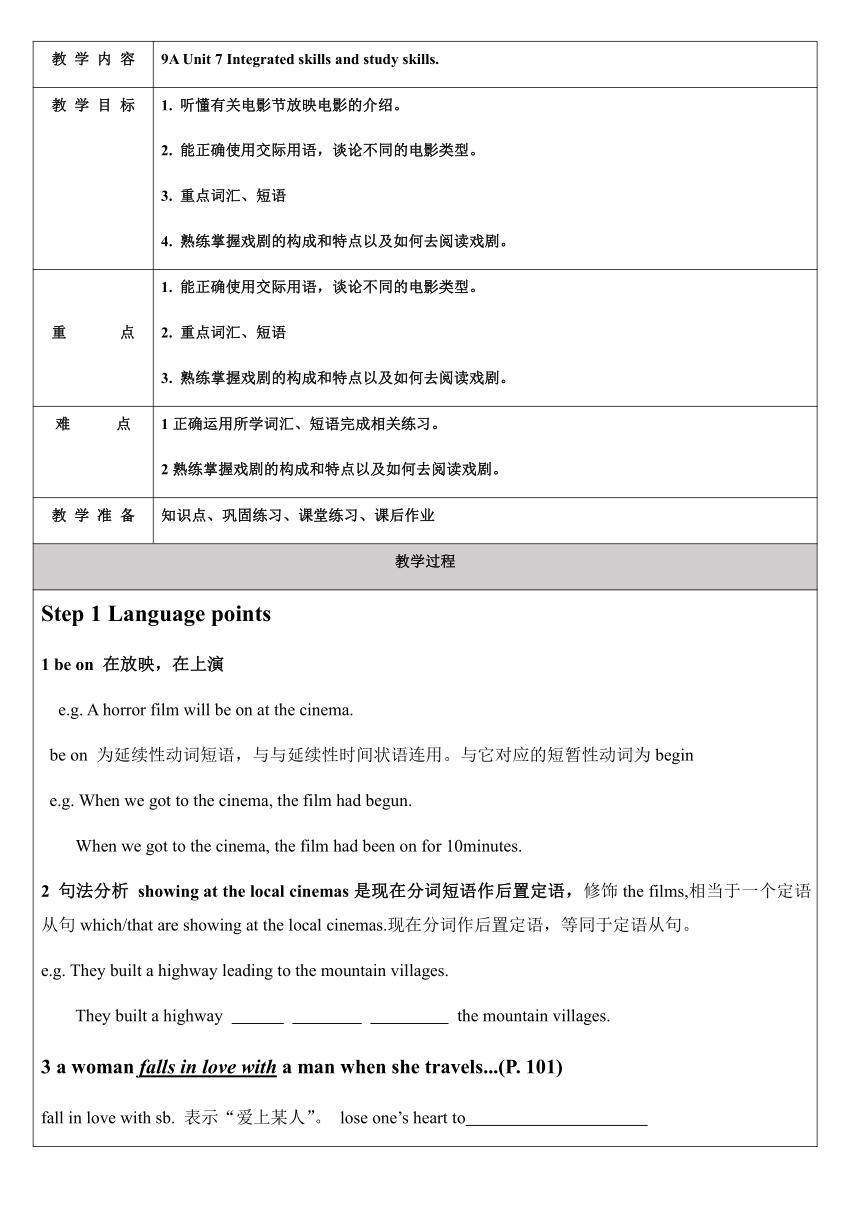
教 学 内 容 9A Unit 7 Integrated skills and study skills. 教 学 目 标 1. 听懂有关电影节放映电影的介绍。 2. 能正确使用交际用语,谈论不同的电影类型。 3. 重点词汇、短语 4. 熟练掌握戏剧的构成和特点以及如何去阅读戏剧。 重 点 1. 能正确使用交际用语,谈论不同的电影类型。 2. 重点词汇、短语 3. 熟练掌握戏剧的构成和特点以及如何去阅读戏剧。 难 点 1正确运用所学词汇、短语完成相关练习。 2熟练掌握戏剧的构成和特点以及如何去阅读戏剧。 教 学 准 备 知识点、巩固练习、课堂练习、课后作业 教学过程 Step 1 Language points 1 be on 在放映,在上演 e.g. A horror film will be on at the cinema. be on 为延续性动词短语,与与延续性时间状语连用。与它对应的短暂性动词为begin e.g. When we got to the cinema, the film had begun. When we got to the cinema, the film had been on for 10minutes. 2 句法分析 showing at the local cinemas是现在分词短语作后置定语,修饰the films,相当于一个定语从句which/that are showing at the local cinemas.现在分词作后置定语,等同于定语从句。 e.g. They built a highway leading to the mountain villages. They built a highway the mountain villages. 3 a woman falls in love with a man when she travels...(P. 101) fall in love with sb. 表示“爱上某人”。 lose one’s heart to He fell in love with an actress. 【拓展】与fall构成的常见短语 fall asleep fall behind fall down fall ill fall off 4...which brings dinosaurs alive on screen...(P. 102) alive作形容词,意为“活着的、仍存在的”,alive作定语时,一般放在被修饰词后面,作后置定语。 例如: The fish is still alive. No man alive will believe it. 【拓展】alive表示“活着的、有生命的”,常作表语或者后置定语;living意为“活着的、健在的”,作表语或者定语;live“活着的、有生命的”,作前置定语。 例如: She was alive when they took her to the hospital. He is the only person alive in the accident. The old man is still living. Don’t touch it; it is a live snake. 5 Daniel, this Saturday’s talk on films has been cancelled. (P. 102) cancel作及物动词,表示“取消、终止”。 例如: We’ll have to cancel the match because of the bad weather. As he is ill, we have to cancel our trip to the West Lake. 6 What do you think about horror films (P. 102) what do you think of/about...意为“你认为……怎么样?”,相当于How do you like... 例如: --What do you think of/about your little brother (=How do you like your like brother ) --I like him very much. 7 Neither do I. (P. 102) “neither/nor+be动词/助动词/情态动词+主语”,意为“……也不……”,表示前面否定的情况也适应于后者;当后者和前者表示肯定情况时,用“so+be动词/助动词/情态动词+主语”意为“也是如此”。 例如: Tom never goes to concerts; neither does his wife. Tom works very hard, so do I. 【注意】使用此句型,需注意以下两点: 1前句是肯定句时,用so; 前句是否定句时,用neither/nor 2 前后的时态必须一致。 【测一测】 1 —I have never been to Hong Kong. A So have I B So I do C Neither do I D Neither have I 2 — He hasn’t seen that interesting film before. A So have I B Neither have I C Nor do I D So do I 8 Coming over very slowly. (P. 103) come over意为“过来、顺便来访”。例如: Would you come over there, pl ... ...
~~ 您好,已阅读到文档的结尾了 ~~